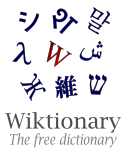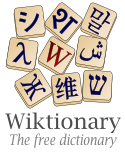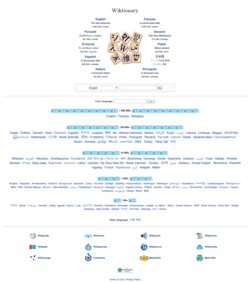Wiktionary
 
|
|

Screenshot of wiktionary.org home page
|
|
|
Type of site
|
Online dictionary |
|---|---|
| Available in | Multi-lingual (over 170) |
| Owner | |
| Created by | Jimmy Wales and the community |
| Slogan(s) | The Free Dictionary |
| Website | www |
| Alexa rank |
|
| Commercial | No |
| Registration | Optional |
| Launched | December 12, 2002 |
| Current status | active |
Wiktionary is a multilingual, web-based project to create a free content dictionary of . It is collaboratively edited via a , and its name is a portmanteau of the words and dictionary. It is available in 172 languages and in Simple English. Like its sister project , Wiktionary is run by the , and is written collaboratively by volunteers, dubbed "Wiktionarians". Its , , allows almost anyone with access to the website to create and edit entries.
Because Wiktionary is not limited by print space considerations, most of Wiktionary's language editions provide definitions and translations of words from many languages, and some editions offer additional information typically found in thesauri and lexicons. The English Wiktionary includes a (thesaurus) of synonyms of various words.
Wiktionary data are frequently used in various natural language processing tasks.
Most of the entries and many of the definitions at the project's largest language editions were created by bots that found creative ways to generate entries or (rarely) automatically imported thousands of entries from previously published dictionaries. Seven of the 18 bots registered at the English Wiktionary created 163,000 of the entries there.
Another of these bots, "ThirdPersBot," was responsible for the addition of a number of third-person conjugations that would not have received their own entries in standard dictionaries; for instance, it defined "smoulders" as the "third-person singular simple present form of smoulder." Of the 648,970 definitions the English Wiktionary provides for 501,171 English words, 217,850 are "form of" definitions of this kind. This means its coverage of English is slightly smaller than that of major monolingual print dictionaries. The Oxford English Dictionary, for instance, has 615,000 headwords, while Merriam-Webster's Third New International Dictionary of the English Language, Unabridged has 475,000 entries (with many additional embedded headwords). Detailed exist to show how many entries of various kinds exist.
...
Wikipedia
